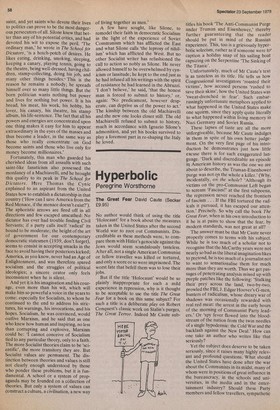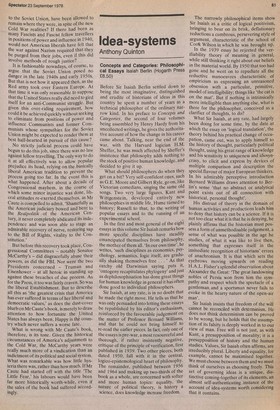Hyperbolic
Peregrine Worsthorne
The Great Fear David Caute (Seeker £9.95) No author would think of using the title 'Holocaust' for a book about the measures taken in the United States after the second World war to root out Communists. Discreditable as these methods were, to compare them with Hitler's genocide against the Jews would seem scandalously tasteless. After all, not a single American Communist or fellow traveller was killed or tortured, and only a score or so were imprisoned. The worst fate that befell them was to lose their jobs.
But lithe title 'Holocaust' would be so plainly inappropriate for such a mild experience in repression, why is it thought to be acceptable to use the title The Great -Fear for a book on this same subject? For such a title is a deliberate play on Robert Conquest's classic work on Stalin's purges, The Great Terror. Indeed Mr Caute sub titles his book 'The Anti-Communist Purge under Truman and Eisenhower,' thereby further guaranteeing that the reader should be put in mind of the Russian experience. This, too is a grievously hyper bolic solecism, rather as if someone were to' caption a holiday snap of his sailing boat capsizing on the Serpentine 'The Sinking of the Titanic'.
Unfortunately, much of Mr Caute's text is as tasteless as its title. He tells us how Congressional investigators 'roasted their victims', how accused persons 'rushed to save their skins', how the United States was 'sweat-drenched in fear'. Such embar rassingly unfortunate metaphors applied to what happened in the United States make one squirm, since they apply quite literally to what happened within living memory in Nazi Germany and Soviet Russia.
These lapses of taste are all the more unforgiveable, because Mr Caute indulges in them in spite of his own better judgement. On the very first page of his introduction he demonstrates just how little excuse there is for such exaggerated language. 'Dark and discreditable an episode ni American history as was the one we are about to describe, the Truman-Eisenhower purge was not on the whole a killer.' (Why, incidentally, on the whole? 'Although its victims on the pro-Communist Left began to scream 'Fascism!' at the first subpoena, the repression never reached the frontiers of fascism . . If the FBI tortured the radicals it pursued, it has escaped our attention.' Precisely. So why call the book The Great Fear, when in his own introduction to it he is at pains to show that the fear, by modern standards, was not great at all?
The answer must be that Mr Caute never properly comes to terms with his subject. While he is too much of a scholar not to recognise that the McCarthy years were not nearly so bad as the liberal imagination likes to pretend, he is too much of a journalist not to want to sensationalise them for much more than they are worth. Thus we get passages of penetrating analysis mixed up with purple patches like the following: 'Stalking their prey across the land, two-by-two, prowled the FBI, J. Edgar Hoover's G-men, hunters of radicalism, whose dreary war of shadows was occasionally rewarded with real red meat: the arrest in the early hours of the morning of Communist Party leaders.' Or 'spy fever flowed into the bloodstream of the nation from the twin needles of a single hypodermic: the Cold War and the backlash against the New Deal.' How can one take an author who writes like that seriously?
Yet the subject does deserve to be taken seriously, since it raises many highly relevant and profound questions. What should the United States have done after the war about the Communists in its midst, many of whom were in positions of great influence in the, bureaucracy, in the schools and universities, in the media and in the entertainment industry? Should these Party members and fellow travellers, sympathetic to the Soviet Union, have been allowed to remain where they were, in spite of the new Cold War realities? If there had been as many Fascists and Fascist fellow travellers In positions of power and influence in 1940, would not American liberals have felt that the war against Nazism required that they be purged from their jobs, even if this did involve methods of rough justice? It is fashionable nowadays, of course, to argue that the Soviet Union posed no danger in the late 1940s and early 1950s. But that is not how it appeared then, as the Red army took over Eastern Europe. At that time it was only reasonable to suppose that the United States really did need to gird itself for an anti-Communist struggle. But given this over-riding requirement, how could it be achieved quickly without seeking to eliminate from positions of power and influence Communists and former Communists whose sympathies for the Soviet Union might be expected to render them at best half-hearted in pursuit of this cause?
No strictly judicial process could have begun to do this job, since there was no law against fellow travelling. The only way to do it at all effectively was to allow popular prejudice its head, relying on the basically liberal American tradition to prevent the process going too far. In the event this is what happened. After about a decade of Congressional mayhem, in the course of which some minor injustice was done, liberal attitudes re-exerted themselves, as Mr Caute is compelled to admit. 'Shamefully as the American judiciary bowed and bent to the Realpolitik of the American Century, it never completely abdicated its independence and was soon able to stage an admirable recovery of nerve, restoring sap to the Bill of Rights, vitality to the Constitution.'
But before this recovery took place, Congressional Committees — notably Senator McCarthy's — did disgracefully abuse their powers, as did the FBI. Nor were the two Presidents concerned — Truman and Eisenhower — at all heroic in standing up against these breaches of due process. As for the Press, it too was fairly craven. So was the liberal Establishment. But to describe all this as 'the greatest crisis that America has ever suffered in terms of her liberal and democratic values,' as does the dust-cover blurb on Mr Caute's book, is merely to draw attention to how fortunate the United States has always been. Happy is the country which never suffers a worse fate.
What is wrong with Mr Caute's book, therefore, is its tone. Given the historical circumstances of America's adjustment to the Cold War, the McCarthy years were really much more of a vindication than an indictment of its political and social system. What was remarkable was how little hysteria there was, rather than how much. If Mr Caute had started off with the title The Little Fear,' his labours would have been far more historically worth-while, even if the sales of the book had suffered accordingly.



































































































 Previous page
Previous page